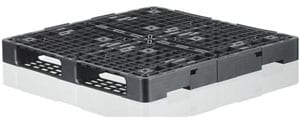The ISPM15(International Standards for Phytosanitary Measures No.15) established by the IPPC (International Plant Protection Convention) and enforced by many governments across the world, has had the effect of restricting and even prohibiting the use of untreated timber palletsand other solid wood packing materials. Plastic pallets are a safe and cost effective way of avoiding the problems associated with the use of wooden pallets.
For a full description of ISPM15 standard and objectives please visit the official ISPM15 information page.
PLASTIC PALLETS |
= |
|
Below is a list of countries that have either imposed, or intend to impose restrictions or prohibitions on the use of untreated solid wood pallets and other packing materials. Avoid the risk of your cargo pallets being rejected and returned to Australia at YOUR COST. Always ship using plastic pallets. If the country you are exporting to is not listed, either check with your customer or just play safe and use plastic pallets.
| Country | Details |
|---|---|
| Argentina | Date of enforcement 1 January 2006. |
| Australia | As of 1 May 2006 Australia began enforcing mandatory treatment (either onshore or off-shore) for all solid wood packaging imported with containerised cargo. All untreated wood packaging will be subject to one of the following: mandatory onshore treatment, re-export or destruction at the importer’s expense. |
| Bolivia | Date of enforcement May 24, 2005, The Bolivian regulations require imported wood packaging to be constructed from debarked wood and to be treated and marked according to the ISPM15 standard. However, there are no requirements that the wood be marked as manufactured from debarked wood. Wood packaging made from unmarked wood may be retained and either treated, destroyed or re-exported. |
| Brazil | Date of enforcement 11 July 2005. |
| Bulgaria | Date of enforcement 24 January 2006. |
| Canada | As of 5 July 2006, imports must comply with requirements of ISPM No. 15 or be subject to removal from the importing country. |
| Chile | Date of enforcement 1 June 2005, will accept a Phytosanitary certificate in lieu of the ISPM 15 mark. At present Chile requires debarked wood packaging. |
| China | Date of enforcement 1 January 2006. |
| Colombia | Date of enforcement 15 September 2005. |
| Costa Rica | Date of enforcement 19 March 2006. |
| Dominican Republic | Date of enforcement 1 July 2006. |
| Ecuador | September 20, 2005 |
| Egypt | October 1, 2005 |
| European Union | March 1, 2005 |
| Guatemala | September 16, 2005 |
| Honduras | February 25, 2006 |
| India | November 1, 2004 (Variation: Phytosanitary certificate required only for WPM not ISPM-15 compliant) |
| Indonesia | No published date of implementation (based on their draft regulation, WPM must be debarked and a packing declaration will be required) |
| Japan | April 1, 2007 |
| Jordan | November 17, 2005 |
| Lebanon | March 26, 2006 |
| Mexico | September 16, 2005 |
| New Zealand | April 16, 2003 (Variation: Bark-free WPM) |
| Nicaragua | No published date of implementation |
| Nigeria | September 30, 2004 |
| Oman | December 2006 |
| Panama | Not yet enforcing ISPM 15 |
| Paraguay | June 28, 2005 |
| Peru | March 1, 2005 |
| Philippines | June 1, 2005 |
| Seychelles | March 1, 2006 |
| South Africa | January 1, 2005 |
| South Korea | June 1, 2005 |
| Switzerland | March 1, 2005 |
| Syria | April 1, 2006 |
| Taiwan | July 2008 |
| Trinidad and Tobago | September 15, 2005 |
| Turkey | January 1, 2006 (Variation: Debarked WPM) |
| Ukraine | October 1, 2005 |
| U.S. | September 16, 2005 (Exemption granted to Canada — must provide import declaration that shipment derived from trees harvested in U.S. or Canada — import lumber must be ISPM-15; 24-hr methyl bromide fumigation schedule in their requirements for imported packaging effective February 7, 2008) |
| Venezuela | June 1, 2005 |
| Vietnam | June 5, 2005 |

